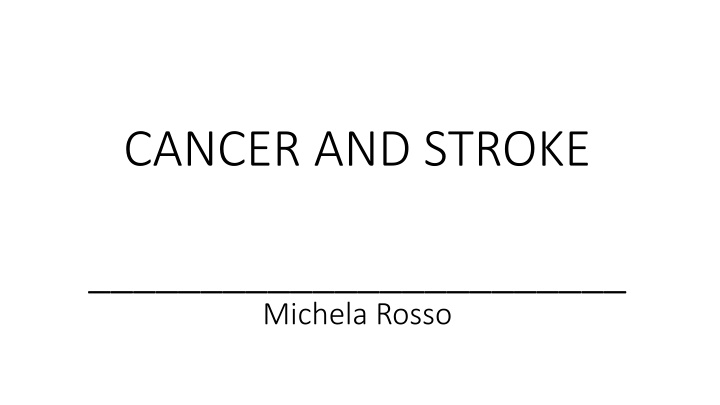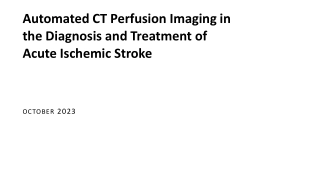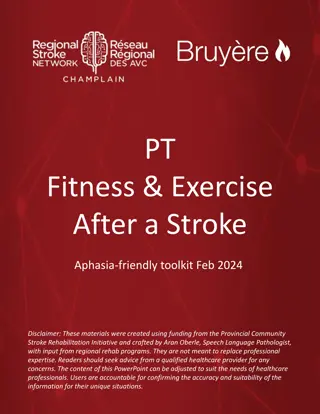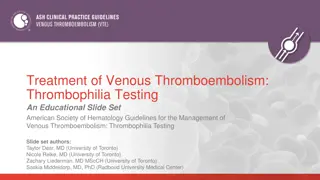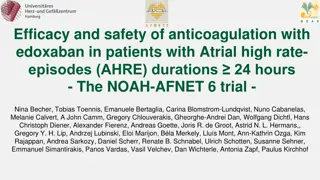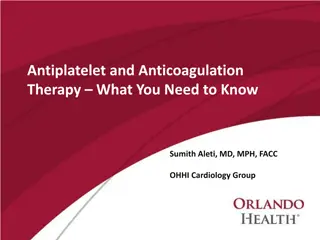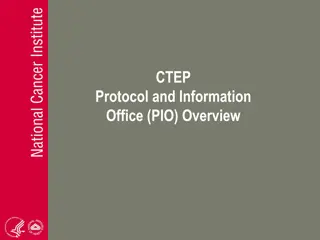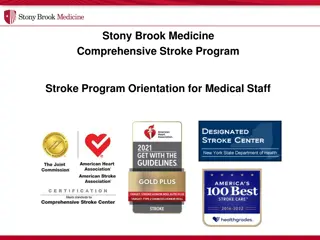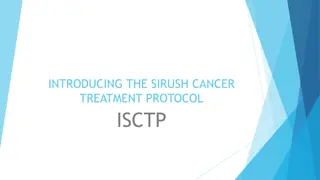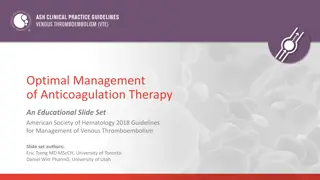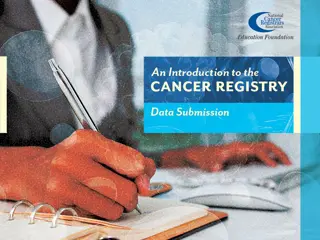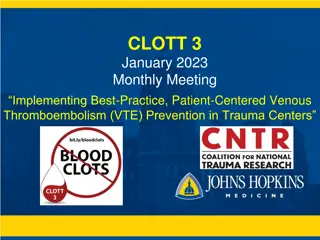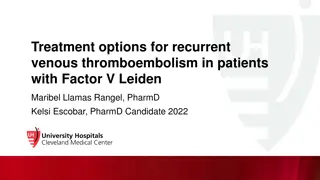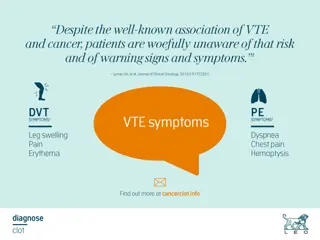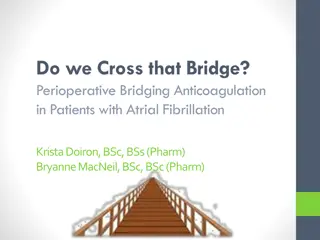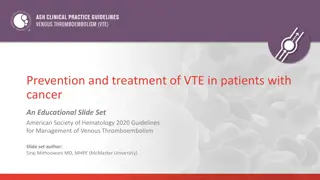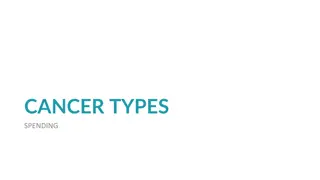Advances in Anticoagulation Therapy for Cancer-Related VTE and Stroke
Recent studies have shown advancements in anticoagulation therapy for cancer patients with venous thromboembolism (VTE) and stroke prevention. Direct oral anticoagulants (DOACs) are now considered beneficial for treating VTE in cancer, offering advantages in administration and efficacy. Different anticoagulant options are recommended based on bleeding risk and drug interactions, marking a shift in managing VTE and stroke in cancer patients. The use of specific anticoagulants like edoxaban and apixaban has shown promising results in both acute VTE and stroke prevention in patients with cancer, demonstrating preserved efficacy and safety profiles. Additionally, cancer patients with embolic stroke of undetermined source (ESUS) have a higher risk of stroke, necessitating specific considerations in secondary stroke prevention.
Download Presentation

Please find below an Image/Link to download the presentation.
The content on the website is provided AS IS for your information and personal use only. It may not be sold, licensed, or shared on other websites without obtaining consent from the author.If you encounter any issues during the download, it is possible that the publisher has removed the file from their server.
You are allowed to download the files provided on this website for personal or commercial use, subject to the condition that they are used lawfully. All files are the property of their respective owners.
The content on the website is provided AS IS for your information and personal use only. It may not be sold, licensed, or shared on other websites without obtaining consent from the author.
E N D
Presentation Transcript
CANCER AND STROKE ________________________ Michela Rosso
CANCER and VTE LMWH for at least 3 to 6 months has been the standard of care in treating cancer-associated VTE [4]. Historically, LMWH have been preferred for cancer-associated VTE given RCTs demonstrating reduced risks of recurrent VTE vs warfarin [5,6]. However, consensus recommends[7,8]; - Use of DOACs (with preference for edoxaban and rivaroxaban) in acute VTE and low bleeding risk, if no significant drug drug interaction - Use of LMWH in acute VTE and high bleeding risk (including intraluminal gastrointestinal and genitourinary cancers or abnormalities)
CANCER, Afib and PRIMARY PREVENTION of STROKE Historically, vitamin K antagonists (VKA) have been preferred to LMWH for stroke prevention in AF and cancer [9] However, given recent studies, DOACs can be an option based on case by case decision making and drug-to-drug interaction [10, 11]
CANCER, Afib and PRIMARY STROKE PREVENTION An analysis of the ENGAGE AF-TIMI 48 (Effective Anticoagulation with factor Xa next Generation in Atrial Fibrillation-Thrombolysis In Myocardial Infarction study 48) trial, which included 1,153 patients who developed cancer post-randomization, demonstrated preserved efficacy and safety of edoxaban compared with warfarin, regardless of cancer status [10] Apixaban had superior safety and efficacy relative to warfarin among 157 patients with active cancer and 1,079 patients with a history of cancer enrolled in the ARISTOTLE (Apixaban for Reduction in Stroke and Other Thromboembolic Events in Atrial Fibrillation) trial [11]
CANCER,ESUS, and SECONDARY STROKE PREVENTION Approximately half of the ischemic strokes in patients with cancer are classified as ESUS, a higher proportion than in those without cancer [12]
DOACs for secondary STROKE PREVENTION IN CANCER DOACs for secondary STROKE PREVENTION IN CANCER DOACs are nowadays considered an attractive option for secondary stroke prevention in cancer patients: DOACs are already recommended for acute VTE in cancer Oral administration facilitates patient compliance and they offer a wide therapeutic window, requiring no laboratory monitoring [13]. DOACs share the short half-life [14] advantage of LMWH WHEN DO NOT USE DOACs: with cancer therapies that affect CYP3A4 metabolism and/or P-gp transport [9]
DOACs for secondary STROKE PREVENTION IN CANCER DOACs for secondary STROKE PREVENTION IN CANCER DOACs are nowadays considered an attractive option for secondary stroke prevention in cancer patients: DOACs are already recommended for acute VTE in cancer Oral administration facilitates patient compliance and they offer a wide therapeutic window, requiring no laboratory monitoring [13]. DOACs share the short half-life [14] advantage of LMWH WHEN DO NOT USE DOACs: with cancer therapies that affect CYP3A4 metabolism and/or P-gp transport [9] IN CONCLUSION: because cancer-related stroke has many possible underlying mechanisms, it is important that neurologists and oncologists work closely together to obtain a consensus for the best management of cancer-stroke patients [1]
BIBLIOGRAPHY 1. Navi BB, Kasner SE, Cancer and embolic stroke of undetermined source. Stroke. 2021;52:1121-1130 2. Sanossian N, Trends in cancer diagnoses among inpatients hospitalized with stroke. JSCVD 2013; 22: 1146 1150 3. Kim SJ, Clues to occult cancer in patients with ischemic stroke. PLoS ONE 2012; 7: e44959. 4. Dardiotis E, Aloizou AM, Markoula S, Siokas V, Tsarouhas K, Tzanakakis G, Libra M, Kyritsis AP, Brotis AG, Aschner M, Gozes I, Bogdanos DP, Spandidos DA, Mitsias PD, Tsatsakis A. Cancer-associated stroke: Pathophysiology, detection and management (Review). Int J Oncol. 2019 Mar;54(3):779-796. doi: 10.3892/ijo.2019.4669. Epub 2019 Jan 2. PMID: 30628661; PMCID: PMC6365034. 5. Lee AY, Low-molecular-weight heparin versus a coumarin for the prevention of recurrent venous thromboembolism in patients with cancer. N Engl J Med. 6. Lee AYY, Kamphuisen PW, Meyer G, et al. Tinzaparin vs warfarin for treatment of acute venous thromboembolism in patients with active cancer: a randomized clinical trial. JAMA 7. Khorana AA, Noble S, Lee AYY, et al. Role of direct oral anticoagulants in the treatment of cancer-associated venous thromboembolism: guidance from the SSC of the ISTH. J Thromb Haemost 2018;16:1891 4. [PubMed: 30027649] 8. National Comprehensive Cancer Network. NCCN Guidelines for Cancer-Associated Venous Thromboembolic Disease. Available at: https://www.nccn.org/Common/FileManager.ashx?fileManagerId=b0461271-ae6f-455a-bbb9-a637326abe49. Accessed January 2, 2019. 9. Mosarla RC, Vaduganathan M, Qamar A, Moslehi J, Piazza G, Giugliano RP. Anticoagulation Strategies in Patients With Cancer: JACC Review Topic of the Week. J Am Coll Cardiol. 2019 Mar 26;73(11):1336-1349. doi: 10.1016/j.jacc.2019.01.017. PMID: 30898209; PMCID: PMC7957366. 10. Fanola CL, Ruff CT, Murphy SA, Jin J, Duggal A, Babilonia NA, Sritara P, Mercuri MF, Kamphuisen PW, Antman EM, Braunwald E, Giugliano RP. Efficacy and Safety of Edoxaban in Patients With Active Malignancy and Atrial Fibrillation: Analysis of the ENGAGE AF - TIMI 48 Trial. J Am Heart Assoc. 2018 Aug 21;7(16):e008987. doi: 10.1161/JAHA.118.008987. PMID: 30369307; PMCID: PMC6201390. 11. Melloni C, Dunning A, Granger CB, Thomas L, Khouri MG, Garcia DA, Hylek EM, Hanna M, Wallentin L, Gersh BJ, Douglas PS, Alexander JH, Lopes RD. Efficacy and Safety of Apixaban Versus Warfarin in Patients with Atrial Fibrillation and a History of Cancer: Insights from the ARISTOTLE Trial. Am J Med. 2017 Dec;130(12):1440-1448.e1. doi: 10.1016/j.amjmed.2017.06.026. Epub 2017 Jul 21. PMID: 28739198. 12. Hart RG, Catanese L, Perera KS, Ntaios G, Connolly SJ. Embolic stroke of undetermined source: a systematic review and clinical update. Stroke. 2017;48:867 872. doi: 10.1161/STROKEAHA.116.016414 13. van Es N and B ller HR: Using direct oral anticoagulants (DOACs) in cancer and other high-risk populations. Hematology Am Soc Hematol Educ Program 2015: 125-131, 2015. Magne JL, Pirvu A, Sessa C, Cochet E, Blaise H and Ducos C: Carotid artery revascularisation following neck irradiation: Immediate and long-term results. Eur J Vasc Endovasc Surg 43: 4-7, 2012. 14. van der Hulle T, den Exter PL, Kooiman J, van der Hoeven JJ, Huisman MV and Klok FA: Meta-analysis of the efficacy and safety of new oral anticoagulants in patients with cancer-associated acute venous thromboembolism. J Thromb Haemost 12: 1116-1120, 2014 15. Nam KW, Kim CK, Kim TJ, An SJ, Oh K, Ko SB, Yoon BW. Treatmen of cryptogenic stroke with active cancer with a new oral anticoagulant. J Stroke Cerebrovasc Dis. 2017;26:2976 2980. doi: 10.1016/j. jstrokecerebrovasdis.2017.07.029 16. Navi BB, Singer S, Merkler AE, Cheng NT, Stone JB, Kamel H, Iadecola C, Elkind MS, DeAngelis LM. Recurrent thromboembolic events after ischemic stroke in patients with cancer. Neurology. 2014;83:26 33. doi:10.1212/WNL.0000000000000539 17. Martinez-Majander N, Ntaios G, Liu YY, Ylikotila P, Joensuu H, Saarinen J, Perera KS, Marti-Fabregas J, Chamorro A, Rudilosso S, et al; NAVIGATE ESUS investigators. Rivaroxaban versus aspirin for secondary prevention of ischaemic stroke in patients with cancer: a subgroup analysis of th NAVIGATE ESUS randomized trial. Eur J Neurol. 2020;27:841 848. doi: 10.1111/ene.14172 18. Park H, Kim J, Ha J, Hwang IG, Song TJ, Yoo J, Ahn SH, Kim K, Kim BM, Kim DJ, et al. Histological features of intracranial thrombi in stroke patients with cancer. Ann Neurol. 2019;86:143 149. doi: 10.1002/ana.25495
